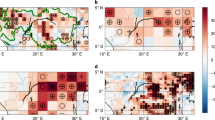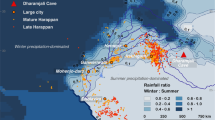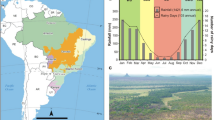Abstract
STEBBING1 has stated that the climate of West Africa was becoming increasingly drier, and that the Sahara was advancing southwards at an alarming rate. The ensuing controversy, which developed in the late 1930's, has been summarized by Jones2. During the past 50 or 100 years there has been a distinct degeneration of the vegetation in many parts of West Africa; but most workers considered this to be caused by human activity rather than by a change in climate and pointed out that there was no meteorological evidence for a progressive, rather than a cyclical, climatic change.
This is a preview of subscription content, access via your institution
Access options
Subscribe to this journal
Receive 51 print issues and online access
$199.00 per year
only $3.90 per issue
Buy this article
- Purchase on Springer Link
- Instant access to full article PDF
Prices may be subject to local taxes which are calculated during checkout
Similar content being viewed by others
References
Stebbing, E. P., Geog. J., 85, 506 (1935).
Jones, B., Geog. J., 91, 401 (1938).
Hopkins, B., J. Ecol. (in the press).
Author information
Authors and Affiliations
Rights and permissions
About this article
Cite this article
HOPKINS, B. A Trend Towards a Longer Dry Season in South-western Nigeria. Nature 194, 861–862 (1962). https://doi.org/10.1038/194861b0
Issue Date:
DOI: https://doi.org/10.1038/194861b0
Comments
By submitting a comment you agree to abide by our Terms and Community Guidelines. If you find something abusive or that does not comply with our terms or guidelines please flag it as inappropriate.



